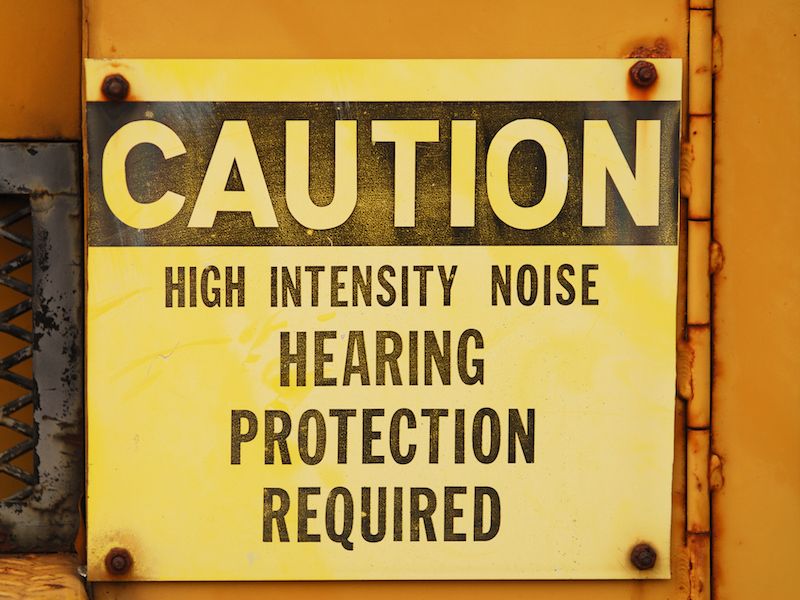
Realizing you should protect your ears is one thing. It’s another matter to know when to protect your ears. It’s not as straight forward as, for example, knowing when to use sunscreen. (Is it sunny and are you going to be outside? Then you need sunscreen.) Even recognizing when you need eye protection is easier (Working with dangerous chemicals? Doing some building? You need to wear eye protection).
When it comes to when to use hearing protection, there seems to be a big grey area which can be risky. Often, we’ll defer to our normal inclination to avoid hearing protection unless we have information that a specified place or activity is hazardous.
Risk Assessments
In general, we’re not very good at assessing risk, especially when it comes to something as intangible as long term hearing damage or loss of hearing. Here are some examples to prove the point:
- Person A goes to a very loud rock concert. 3 hours is approximately the length of the concert.
- Person B runs a landscaping company. After mowing lawns all day, she goes home to quietly read a book.
- Person C is an office worker.
You might believe the hearing danger is greater for person A (let’s just call her Ann). For most of the next day, her ears will still be screeching from the loud performance. It seems fair to assume that Ann’s activity was very risky.
The noise that person B (let’s just call her Betty), is subjected to is not as loud. Her ears don’t ring. So her ears must be safer, right? Not necessarily. Because Betty is mowing every day. So even though her ears never ring out with pain, the injury accrues gradually. If experienced too often, even moderately loud sounds can have a damaging affect on your ears.
What’s happening with person C (let’s call her Chris) is even more difficult to sort out. Lawnmowers have instructions that emphasize the hazards of long-term exposure to noise. But even though Chris works in a quiet office, she has a very noisy, hour-long commute each day on the train. Additionally, although she works at her desk all day, she listens to her music through earbuds. Is protection something she should consider?
When is it Time to Worry About Safeguarding Your Hearing?
The standard rule of thumb is that if you have to raise your voice to be heard, your environment is noisy enough to do harm to your hearing. And if your surroundings are that loud, you really should think about wearing earplugs or earmuffs.
The cutoff needs to be 85dB if you want to get scientific. Sounds above 85dB have the ability to cause damage over time, so in those circumstances, you need to consider wearing hearing protection.
Your ears don’t have their own decibel meter to warn you when you get to that 85dB level, so many hearing professionals recommend getting special apps for your phone. These apps can tell you when the surrounding noise is approaching a harmful level, and you can take proper steps.
A Few Examples
Even if you do download that app and bring it with you, your phone may not be with you everywhere you go. So a few examples of when to protect your ears might help you establish a good standard. Here we go:
- Household Chores: Even mowing the lawn, as previously mentioned, necessitates hearing protection. Cutting the grass is a great illustration of the type of household job that might cause injury to your hearing but that you probably don’t think about all that often.
- Driving & Commuting: Do you drive for Lyft or Uber? Or perhaps you’re just hanging around downtown for work or boarding the subway. The noise of living in a city is bad enough for your ears, not to mention the added damage caused by cranking up your music to drown out the city noise.
- Operating Power Tools: You know that working every day at your factory job will call for ear protection. But how about the hobbyist building in his garage? Most hearing professionals will suggest you use hearing protection when operating power tools, even if it’s just on a hobbyist level.
- Exercise: You know your morning spin class? Or maybe your daily elliptical session. All of these cases could require hearing protection. Those instructors who make use of sound systems and microphones (and loud music) to motivate you may be good for your heart rate, but all that loudness is bad for your ears.
- Listening to music with earbuds. OK, this doesn’t require protection but does require caution. Give consideration to how loud the music is, how long you’re listening to it, and whether it’s going directly into your ears. Noise-canceling headphones are a good choice to prevent having to turn the volume way up.
These illustrations might give you a suitable baseline. When in doubt, though, you should defer to protection. Instead of leaving your ears exposed to future injury, in most situations, it’s better to protect your hearing. Protect today, hear tomorrow.